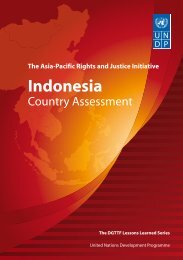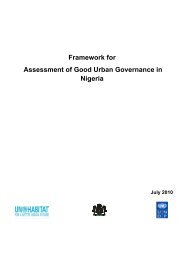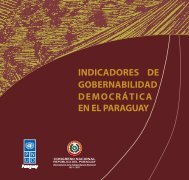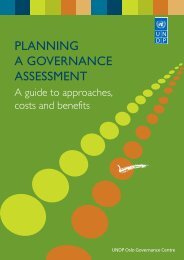A Users' Guide to Measuring Local Governance
A Users' Guide to Measuring Local Governance
A Users' Guide to Measuring Local Governance
Create successful ePaper yourself
Turn your PDF publications into a flip-book with our unique Google optimized e-Paper software.
21<br />
<strong>Local</strong> Integrity Initiative<br />
Producer<br />
Global Integrity<br />
His<strong>to</strong>ry<br />
The <strong>Local</strong> Integrity Initiative is an extension of the<br />
nationally-focused Global Integrity Reports, aiming<br />
<strong>to</strong> realise a collection of unique projects assessing<br />
anti-corruption and governance at the sub-national<br />
and sec<strong>to</strong>r levels, within countries.<br />
Objectives<br />
The <strong>Local</strong> Integrity Initiative has the objective <strong>to</strong><br />
meet a demand in the development community<br />
for actionable data at the sub-national level,<br />
in order <strong>to</strong> inform policy choices and priorities at<br />
the county, state, provincial, or regional level in a<br />
country. The <strong>Local</strong> Integrity Initiative applies a<br />
series of rigorous quantitative indica<strong>to</strong>rs <strong>to</strong> states,<br />
counties, or provinces within a country <strong>to</strong> assess<br />
the strengths and weaknesses of sub-national anticorruption<br />
and good governance mechanisms.<br />
The goals of the <strong>Local</strong> Integrity Initiative are<br />
<strong>to</strong> generate credible and actionable data<br />
assessing the existence and effectiveness of<br />
key governance and anti-corruption mechanisms<br />
at the county-level and designing an evidencebased<br />
advocacy and outreach campaigns.<br />
Applicability<br />
County, state, provincial, or regional administrative<br />
levels in a country.<br />
Types and sources of data used<br />
Information is primarily objective (e.g. a web link <strong>to</strong><br />
a relevant report, or reference <strong>to</strong> a specific law<br />
or institution), drawing sometimes from more<br />
subjective sources (e.g. an interview conducted<br />
with a knowledgeable individual), but always<br />
backed up with evidence.<br />
Methodology<br />
The sub-national Integrity Indica<strong>to</strong>rs, like their<br />
national counterparts, are based on a simple yet<br />
powerful concept. Rather than trying <strong>to</strong> measure<br />
actual corruption, considered virtually impossible<br />
by experts, the <strong>to</strong>ol quantitatively assesses the<br />
opposite of corruption, that is, the access that<br />
citizens and businesses have <strong>to</strong> a country’s<br />
provincial, regional or state government; their<br />
ability <strong>to</strong> moni<strong>to</strong>r its behaviour; and their ability<br />
<strong>to</strong> seek redress and advocate for improved<br />
governance. The sub-national Integrity Indica<strong>to</strong>rs<br />
break down that “access” in<strong>to</strong> a number of<br />
categories and indica<strong>to</strong>rs. In table 42 it is possible<br />
<strong>to</strong> see the categories and sub-categories in which<br />
indica<strong>to</strong>rs are organised in the pilot study in<br />
Liberia.<br />
Each sub-category is assessed through scorecards<br />
that contain indica<strong>to</strong>rs are assessing the following<br />
three different conditions:<br />
• The existence of public integrity mechanisms,<br />
including laws and institutions, which promote<br />
public accountability and limit corruption<br />
(indica<strong>to</strong>rs assessing the laws, regulations, and<br />
agency/enteritis that are place at the<br />
sub-national level.<br />
• The effectiveness of those mechanisms<br />
(indica<strong>to</strong>rs assessing such aspects of public<br />
integrity as those same mechanisms’<br />
protection from political interference;<br />
appointments that support the independence<br />
of an agency; professional, full-time staffing<br />
and funding; independently initiated<br />
investigations; and regular imposition of<br />
penalties).<br />
• The access that citizens have <strong>to</strong> those<br />
mechanisms (indica<strong>to</strong>rs assessing the availability<br />
of public reports <strong>to</strong> citizens, or publicly<br />
available information, within a reasonable time<br />
period and at a reasonable cost).<br />
All indica<strong>to</strong>rs, regardless of type, are scored on the<br />
same ordinal scale of 0 <strong>to</strong> 100 with zero being the<br />
worst possible score and 100 perfect. “In law”<br />
indica<strong>to</strong>rs provide an objective assessment of<br />
A Users’ <strong>Guide</strong> <strong>to</strong> <strong>Measuring</strong> <strong>Local</strong> <strong>Governance</strong> 141




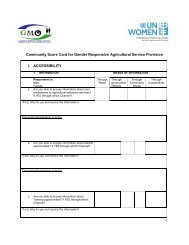

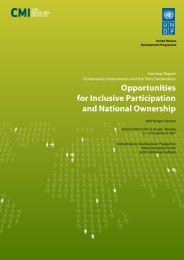
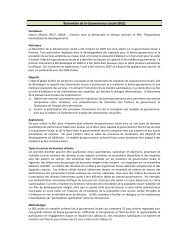
![GuÃa del Usuario ] - Governance Assessment Portal](https://img.yumpu.com/44740603/1/190x253/gua-a-del-usuario-governance-assessment-portal.jpg?quality=85)
